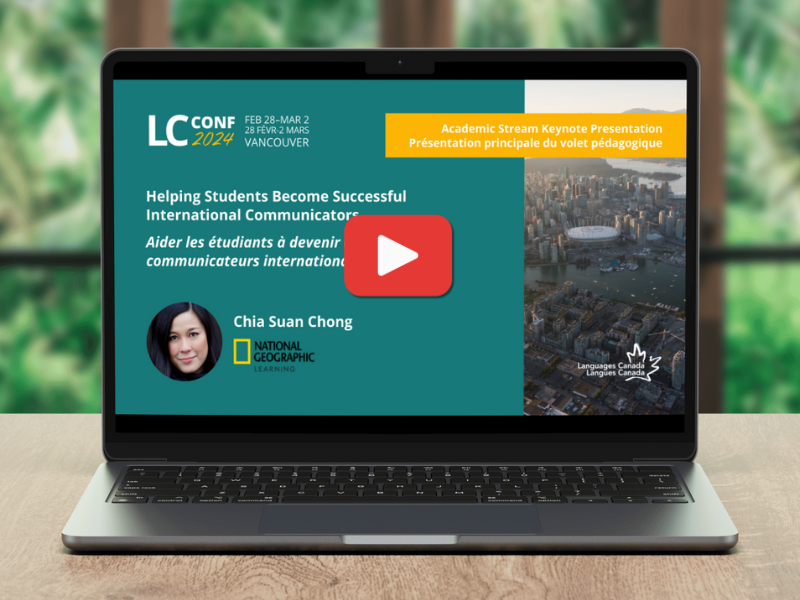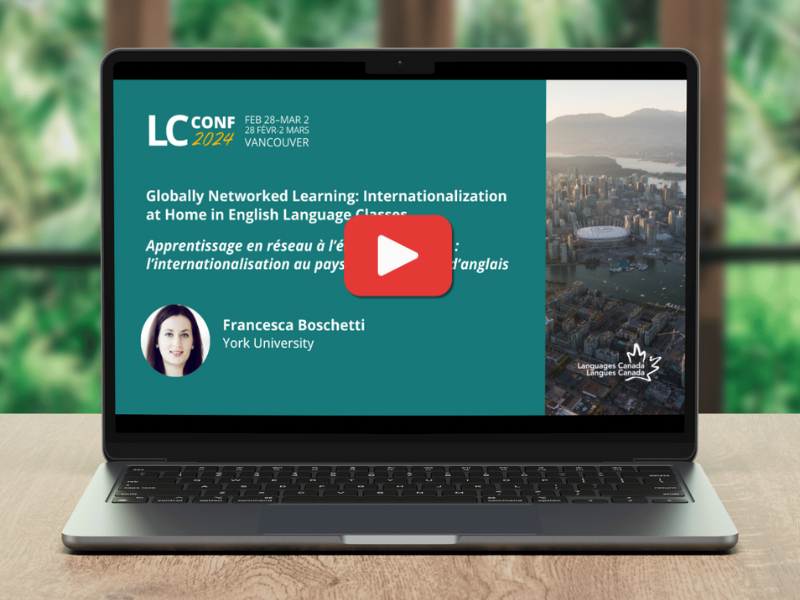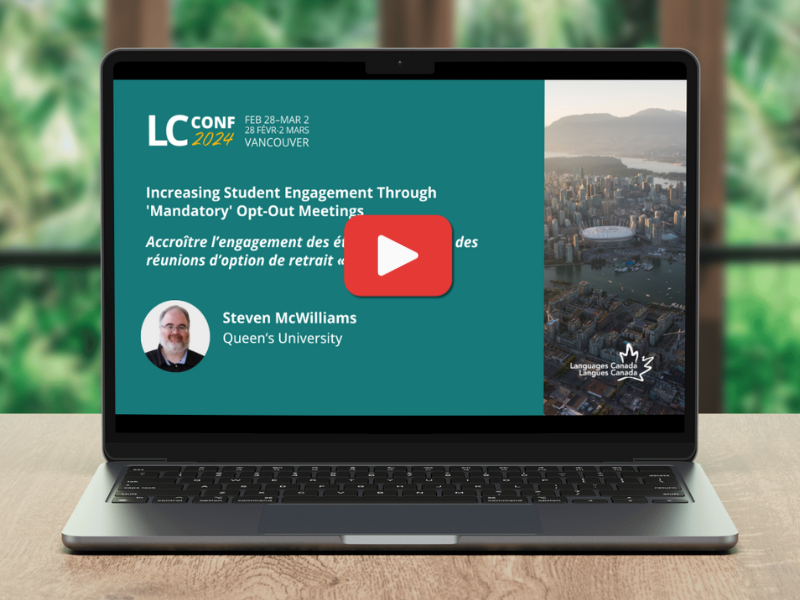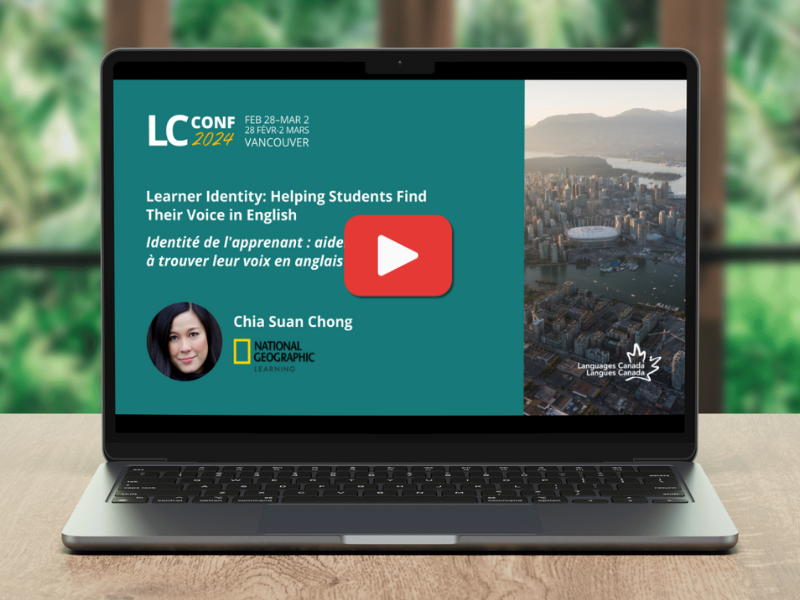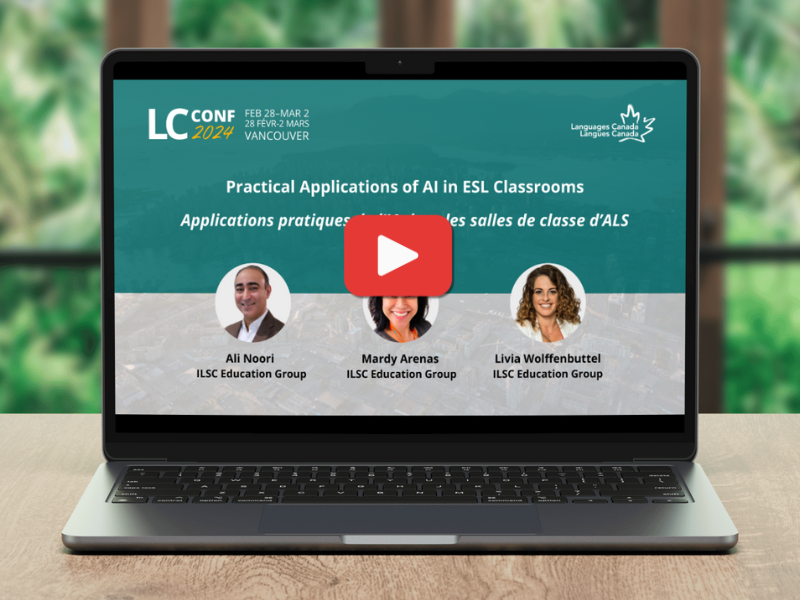By continuing to use our site, you consent to the processing of cookies, user data (location information, type and version of the OS, the type and version of the browser, the type of device and the resolution of its screen, the source of where the user came from, from which site or for what advertisement, language OS and Browser, which pages are opened and to which buttons the user presses, ip-address) for the purpose of site functioning, retargeting and statistical surveys and reviews.
Professional Development Video Series
Watch professional development sessions from the Languages Canada 17th Annual Conference
Languages Canada is committed to providing high quality and relevant professional development opportunities to its members.
For those who were not able to attend the LC 2024 Conference in Vancouver, we are making the six recorded sessions below available at an affordable price.
Special discounted rates are offered to purchase the series of six videos, with or without participant certificates being provided.
Price List (LC members)
-
Complete bundle of 6 videos (links only): $100
- Complete bundle of 6 videos + up to 10 participant certificates (all videos listed on certificate): $200
- Individual videos (links only): $25
- Bundle of 10 participant certificates (at least 1 video purchase required, purchased video(s) listed on certificates): $100
- Bundle of 20 participant certificates (at least 1 video purchase required, purchased video(s) listed on certificates): $200
To order
- View the list of available videos below and click here to order.
- Once your order and payment is received, the LC team will send you the links to the video(s) ordered and instructions on how to receive participant certificate(s) if ordered.
If you have any questions, please contact us at info@languagescanada.ca.
As outlined in the LC Standard, professional development activities for all language teaching staff should be documented.
E.5b Professional development activities are documented and consistent with the Languages Canada Professional Development Specifications and may include but are not limited to:
- in-house workshops
- access to/review of current publications
- conference attendance
- conference presentations
- participation in professional organizations
Helping Students Become Successful International Communicators
Chia Suan Chong
Author, communication skills trainer and teacher trainer
National Geographic Learning
Participants in this session will learn about the skills students need to communicate successfully with people who are different from themselves, and the ways we can prepare them for the increasingly international environments that they will need to thrive in when they leave the classroom. Chia will use storytelling, reflection, and discussion activities to help instructors and administrators examine key global competencies.
Globally Networked Learning: Internationalization at Home in English Language Classes
Francesca Boschetti
Associate Director
York University English Language Institute
At a time when student mobility had drastically changed during the COVID-19 pandemic, language programs found a way to continue to create and enhance opportunities for our students to experience "internationalization at home" initiatives. Through a collaboration with York International, York University English Language Institute (YUELI) launched a Globally Networked Learning project – a virtual exchange between English for Academic Purposes students at YUELI and English for Hotel Administration students at Pontificia Universidad Católica Madre y Maestra in the Dominican Republic. Hoping to inspire colleagues in other institutions who may be interested in internationalization of the curriculum in English language classes through a multicultural virtual exchange, this session will share the best practices, learning outcomes, tools and strategies, and challenges encountered from this virtual exchange experience, including how YUELI identified a university partner, designed programming, collaborated with instructors, and engaged different cohorts of students.
ChatGPT in the Classroom: Students' Ranking of Argumentative Papers Using ChatGPT in the Writing Process
Julie Lee
UAP (University Access Program) and Communications instructor
University Canada West
This presentation will discuss the results of an in-class study which investigated ChatGPT's role in academic essay composition. Students were divided into 4 groups with various uses of ChatGPT to complete an argumentative essay task: the control group using no ChatGPT, the ChatGPT Pre-Writing group, the ChatGPT Post-Writing group and the All-ChatGPT Group. After essay completion, participants ranked the essays based on argumentative quality and content. This structured approach aimed to discern the impacts of ChatGPT at various stages, offering insights into its efficacy in academic writing and discouraging utilization of ChatGPT for academic cheating.
Increasing Student Engagement Through 'Mandatory' Opt-Out Meetings
Steven McWilliams
Educational Developer and Student Advisor
Queen's University School of English
This presentation will share an important project that Queen’s University School of English has embarked upon, which involved transitioning from a passive and reactive academic advising service, to a more proactive model typified by one key policy — one-to-one opt-out meetings for every student with the student advisor. This session will share details of the methodology used, student feedback from before the change and after, and discuss the pros and cons of such a change. Participants will leave this session with a concrete idea of the effectiveness of ‘mandatory’ opt-out meetings, and how to implement it in their respective academic contexts.
Learner Identity: Helping Students Find their Voice in English
Chia Suan Chong
Author, communication skills trainer and teacher trainer
National Geographic Learning
For many students, English is a tool for international communication. Students will need to mediate interactions with people from different cultural backgrounds while accommodating, adapting, and accurately interpreting other people, all in a second language. But how much ownership do they feel of English? How confident do they feel about speaking up in a group setting? Are they able to express their identity in English? This talk explores the importance of helping students develop their relationship with English, and considers the strategies and the practical activities we can use to help students make English their own.
Practical Applications of AI in ESL Classrooms
Ali Noori
Director
ILSC Education Group and Fanshawe College
Mardy Arenas
Director of Operations
ILSC Education Group, Vancouver
Livia Wolffenbuttel
Academic Manager
ILSC Education Group, Vancouver
Unless you have been living under a rock for the last couple of years, you have definitely heard about Artificial Intelligence (AI) and its massive impact on everything we do. While many compare the results of AI emergence to the impact of the Internet, the wide use of AI is being increasingly compared to the even more impactful invention of the wheel, by many others. The use of AI in education is often shrouded in a combination of mythical and sci-fi fearmongering and perplexed intimidation and insecurity. While it is impossible to cover the full impact of AI on different facets of the ELT industry in 45 minutes to an hour, the purpose of this talk is to demystify the use of AI in ESL classrooms by enumerating some of its practical applications in the context of ESL learning/teaching and explore its empowering potential for both learners and educators.

